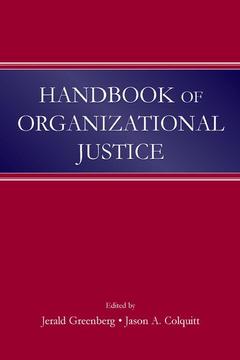Handbook of Organizational Justice
Coordonnateurs : Greenberg Jerald, Colquitt Jason A.

Matters of perceived fairness and justice run deep in the workplace. Workers are concerned about being treated fairly by their supervisors; managers generally are interested in treating their direct reports fairly; and everyone is concerned about what happens when these expectations are violated. This exciting new handbook covers the topic of organizational justice, defined as people's perceptions of fairness in organizations.
The Handbook of Organizational Justice is designed to be a complete, current, and comprehensive reference chronicling the current state of the organizational justice literature. Tracing the development of ideas regarding organizational justice, this book:
*introduces the topic of organizational justice from a historical perspective and presents fundamental issues regarding the nature of organizational justice;
*examines the justice judgment process, specifically addressing basic psychological processes, such as the roles of control, self-interest, morality, and trust in the formation of justice judgments;
*discusses the consequences of fair and unfair treatment in the workplace;
*focuses on such key issues as promoting justice in the workplace in ways that help manage stress, and the underlying processes that account for the effectiveness of justice applications;
*examines the generalizability of the interaction between process and outcomes and focuses on the notion of cross-cultural differences in justice effects; and
*summarizes the state of the science of organizational justice and presents various issues for future research and theorizing.
This Handbook is useful as a guide for professors and graduate students, primarily in the fields of management and psychology. It also is highly relevant to professionals in the fields of communication, sociology, legal studies, marketing, and human resources management.
Contents: Preface. Part I: Introduction.J.A. Colquitt, J. Greenberg, C.P. Zapata-Phelan, What Is Organizational Justice? A Historical Overview of the Field. Part II: Construct Validity Issues.M.L. Ambrose, A. Arnaud, Are Procedural Justice and Distributive Justice Conceptually Distinct? R.J. Bies, Are Procedural Justice and Interactional Justice Conceptually Distinct? J.A. Colquitt, J.C. Shaw, How Should Organizational Justice Be Measured? Part III: The Justice Judgment Process.D.L. Shapiro, J.M. Brett, What Is the Role of Control in Organizational Justice? J.Z. Gillespie, J. Greenberg, Are the Goals of Organizational Justice Self-Interested? R. Folger, R. Cropanzano, B. Goldman, What Is the Relationship Between Justice and Morality? R.J. Lewicki, C. Wiethoff, E.C. Tomlinson, What Is the Role of Trust in Organizational Justice? Part IV: Justice Effects.K. Van den Bos, What Is Responsible for the Fair Process Effect? D.E. Conlon, C.J. Meyer, J.M. Nowakowski, How Does Organizational Justice Affect Performance, Withdrawal, and Counterproductive Behavior? S.L. Blader, T.R. Tyler, How Can Theories of Organizational Justice Explain the Effects of Fairness? R.H. Moorman, Z.S. Byrne, How Does Organizational Justice Affect Organizational Citizenship Behavior? Part V: Justice Applications.R. Vermunt, H. Steensma, How Can Justice Be Used to Manage Stress in Organizations? S.W. Gilliland, J.M.S. Hale, How Can Justice Be Used to Improve Employee Selection Practices? E.F. Stone-Romero, D.L. Stone, How Do Organizational Justice Concepts Relate to Discrimination and Prejudice? D.R. Bobocel, A. Zdaniuk, How Can Explanations Be Used to Foster Organizational Justice? D.P. Skarlicki, G.P. Latham, How Can Training Be Used to Foster Organizational Justice? Part VI: Generalizability Issues.J. Brockner, B. Wiesenfeld, How, When, and Why Does Outcome Favorability Interact With Procedural Fairness? K. Leung, How Generalizable Are Justice Effects Across Cultures? Part VII: Integration.J.A. Colquitt, J. Greenberg, B.A. Scott, Organizational Justice: Where Do We Stand?
Date de parution : 04-2005
15.2x22.9 cm
Date de parution : 09-2014
15.2x22.9 cm
Thèmes de Handbook of Organizational Justice :
Mots-clés :
interactional; procedural; van; den; bos; fairness; heuristic; theory; distributive; perceptions; Fair Process Effect; Social Exchange Explanations; Fairness Heuristic Theory; Interactional Justice; Justice Researchers; Referent Cognitions Theory; Inrole Performance; Procedural Fairness Information; Vice Versa; Procedural Justice; Organizational Justice Research; Organizational Justice Literature; Group Engagement Model; Organizational Justice; Uncertainty Management Theory; Fairness Perceptions; Procedural Fairness; Interpersonal Justice; Justice Perceptions; Informational Justice; Chinese MBA Student; People's Self-evaluations; Organizational Justice Researchers; High Power Distance Societies; Outcome Favorability



